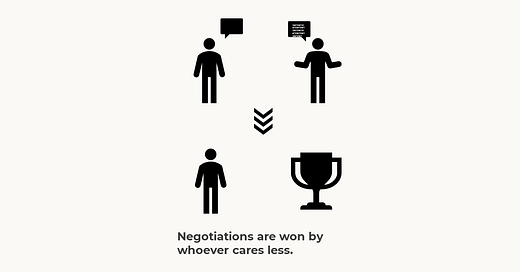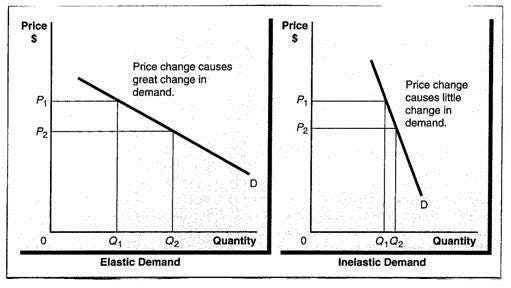The title of this post might sound counterintuitive. Won't those who make an effort to understand a deal and get the most information end up winning? We can explain why this is not necessarily true using the economic concept of elasticity. The elasticity of demand measures how responsive the quantity demanded is to a change in price. The elasticity of supply measures how responsive the quantity supplied is to a change in price. More responsive equals more elastic.
Let’s imagine a situation in which two parties are negotiating the sale of a house. If the buyer (demander) has an elastic demand for the house, that is, they have many substitutes to choose from if the price of this particular house is too high for them, they won’t fight that hard to “win” the negotiation, since they can look for one of their other options. This is true if demand is more elastic than supply.
In this example, the demander would have more power and “care” less, as they have other options available. I hope this example helped you understand the reasoning behind the title of this post.
However, this theory can be applied to non-economic negotiations. For example, let’s say you and two friends want to do something this weekend. You could go to a concert, watch a soccer game, or visit a nearby national park. Imagine you and one of your friends don’t have a strong preference—you’re okay with any of the options. This means your demand is elastic. If the soccer game is too expensive or requires a longer drive, you can still choose the concert or the national park.
But your other friend really wants to go to that soccer game, no matter how far or expensive it is. His demand is inelastic. If, when you are deciding (negotiating), he seems desperate, he will have less power in the negotiation. If you went to the concert instead, you and your “elastic” friend wouldn’t lose anything, but your “inelastic” friend would because he values that soccer game more than the concert.
Now, if you are close friends and see that your friend is really excited about going to the game, you might go anyway—you don’t have a preference, remember. That would be the option that would make everyone better off. Since you and one of the friends value all options similarly, but your other friend values the game more, the total surplus is the highest it can be.
And this is the other side of negotiations. As economic theory says, trade creates a consumer and producer surplus. In this case, we can say that surplus = happiness. The thing is, negotiations might be short-term, but you want the relationships with the other parties to be long-term. For that reason, you always want to be fair and ethical and only associate with individuals who are.
In How To Get Rich, Naval says that if someone takes advantage of you in a negotiation, your best option is to turn it from a short-term to a long-term game. Try to make it a repeat game. Try to bring reputation into the negotiation. Try to include other people who may want to play games with this person in the future.
This quote explains the power of turning negotiations into long-term relationships. It emphasizes the importance of establishing a good reputation, where fairness will be seen positively by others who might also do business with either party. It shows how being dishonest could be rewarded in the short term but not in the long term. And remember, success comes from focusing on the long-term things.
To conclude, I want to draw the key conclusions. When negotiating:
· Don’t make yourself look desperate.
· Focus on the relationship with the other party.
· Turn deals into long-term games
I hope you enjoyed this post! I’d love to hear your opinions and insights, whether they are positive or negative! If you liked what you read, consider subscribing! Please leave a comment or message me on X, Instagram, or Facebook, and we can chat! Thanks for reading!
See you later!








